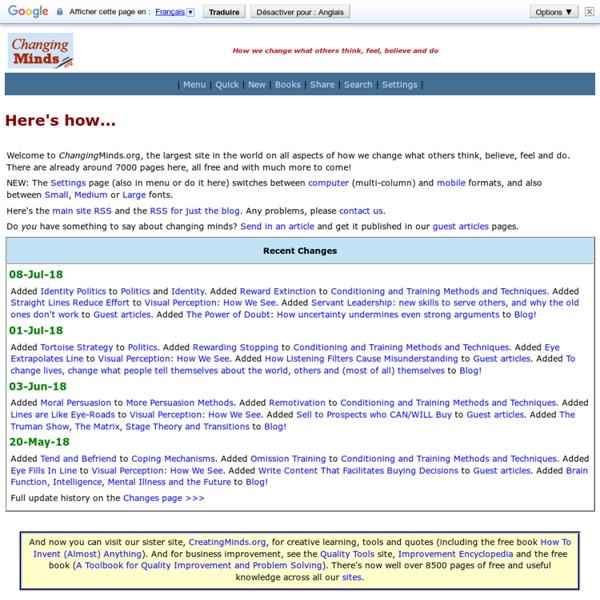



The tricks propagandists use to beat science Back in the 1950s, health professionals became concerned that smoking was causing cancer. Then, in 1952, the popular magazine Reader’s Digest published “Cancer by the Carton,” an article about the increasing body of evidence that proved it. The article caused widespread shock and media coverage. Today the health dangers of smoking are clear and unambiguous. And yet smoking bans have been slow to come into force, most having appeared some 40 years or more after the Reader’s Digest article.
The Sixteen Personality Types - High-Level ISTJ - The Duty Fulfiller Serious and quiet, interested in security and peaceful living. Extremely thorough, responsible, and dependable. Well-developed powers of concentration. Usually interested in supporting and promoting traditions and establishments. ParadigmOfComplexity The last few decades have seen the emergence of a growing body of literature devoted to a critique of the so-called “old” or “Cartesian-Newtonian” paradigm which, in the wake of the prodigious successes of modern natural science, came to dominate the full range of authoritative intellectual discourse and its associated worldviews. Often coupled with a materialistic, and indeed atomistic, metaphysics, this paradigm has been guided by the methodological principle of reductionism. The critics of reductionism have tended to promote various forms of holism, a term which, perhaps more than any other, has served as the rallying cry for those who see themselves as creators of a “new paradigm.” At the forefront of such a challenge, and in many ways the herald of the new paradigm, is the relatively new movement of transpersonal psychology.
35 Educational Resources to Encourage Inquiry & Inventive Thinking This is a sponsored post. I’ve scoured the internet, including all of my favourite social media sites, to bring you a fantastic collection of online inquiry and inventive thinking resources that I know will inspire and motivate both you and your students. The collection includes Lego, science, practical activity ideas, engineering, videos, animation, technology and a tonne of fun facts – so there is sure to be something for everyone! Sean Kenney Lego Certified Master Builder’s YouTube Channel: Best-selling author and artist, Sean Kenney, uses LEGO toys to build anything and everything you can imagine.
50 Lessons I wish I had learned earlier Welcome to our blog! Here you'll find bits and pieces of wisdom learned from cycling 17,000 miles from Alaska to Argentina together as a family. Hope it inspires you to live your dream! My book about our journey, Changing Gears, is now released!
5 things the media does to manufacture outrage. 5 things the media does to manufacture outrage. People are so sensitive these days! People are just offended by every little thing! 12 Brain Rules Buy Brain Rules The Brain Rules, illustrated Explore each rule through illustrations, charts and video. These tutorials are designed to reinforce the concepts in the book; we recommend reading the corresponding chapter first. EXERCISE: Exercise boosts brain power. The Octarine argument. Yes, yes - colour corresponds with real properties. But colour itself is not in the external physical world. It's like those cases where a picture from a telescope or a microscope is given colours artificially to help show up the different substances.
Social Media for Teachers: Guides, Resources, and Ideas Although students are evermore connected to the social web, many of these networks remain out-of-class digital playgrounds where students congregate. In a 2014 survey of 1,000 teachers, just one in five said they use social media regularly with students. Of course, it can be a challenge to incorporate social media into lessons. There are many gray areas for teachers to navigate, like setting guidelines, accessibility at school, and student safety. But to help teachers navigate this ever-changing landscape of social media tools, here are some of the best guides on the web for four popular networks, Facebook, Instagram, Twitter, and Pinterest. More Great Reads From Edutopia
40 Belief-Shaking Remarks From a Ruthless Nonconformist If there’s one thing Friedrich Nietzsche did well, it’s obliterate feel-good beliefs people have about themselves. He has been criticized for being a misanthrope, a subvert, a cynic and a pessimist, but I think these assessments are off the mark. I believe he only wanted human beings to be more honest with themselves. He did have a remarkable gift for aphorism — he once declared, “It is my ambition to say in ten sentences what others say in a whole book.” A hundred years after his death, Nietzsche retains his disturbing talent for turning a person’s worldview upside-down with one jarring remark. Even today his words remain controversial. Weasel word - Wikipedia A weasel word, or anonymous authority, is an informal term for words and phrases aimed at creating an impression that a specific or meaningful statement has been made, when instead only a vague or ambiguous claim has actually been communicated. This can enable the speaker to later deny the specific meaning if the statement is challenged. Where this is the intention, use of weasel words is a form of tergiversation. Weasel words can be used in advertising and in political statements, where it can be advantageous to cause the audience to develop a misleading impression. Some weasel words have the effect of softening the force of a potentially loaded or otherwise controversial statement through some form of understatement; for example, using detensifiers such as "somewhat" or "in most respects".[1] Origin[edit]
25 TED Talks that will change how you see the world Mahatma Gandhi once said, “Live as if you were to die tomorrow. Learn as if you were to live forever.” If this sounds like a philosophy you can relate to, then you’ll love TED talks. These informational 17 minute presentations are given at annual conferences by some of the world’s greatest thinkers. Their aim is simple: To inspire ideas and change attitudes around the world. As of April 2014, there were over 1,700 of these incredible talks available free online to choose from.